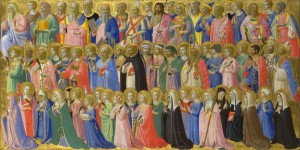“Christ, not the priest, not anyone else, is the centre”
A great article from an interview with Dom Alcuin Reid, from over at NLM. Some highlights:
“But why are bodily gestures or, generally, the way in which a priest celebrates the Mass important for the life of the Church? Isn’t Faith, aren’t good works more important?
Faith and good works are not disembodied. We are body and soul together in this life and we discipline and train our bodies for so many things, for sport, athletics, and so on.We must discipline and train our bodies also spiritually. As in certain circumstances we would behave with our bodies with respect and attention towards other people, so when we come for Christ in the liturgy, we too have certain bodily gestures.
It is very unusual for us in our modern culture to kneel. But to kneel in the presence of Christ in the liturgy tells us that we are doing something not usual, it speaks to us. To genuflect, to bow profoundly, to sing the Church’s chant in a disciplined way, all these things remind us physically that we are doing something different to a normal way of behaving, relaxing. So, too, the Church’s liturgical vesture reminds us that this is not a priest, a human person that is doing his thing. He is doing Church’s thing, he is putting on Christ, which is symbolised by the vestments.
These things are not part of Divine Law themselves, they are human traditions coming out of love and worship for the Church. They are not absolute, but they are tried and tested means of expressing our Faith and worship.”
Also, this:
“The Mass is not entertainment, it’s worship, so what we need to do for young people is not provide an imitation of the culture we think they might like, but to introduce them to the person of Christ active in the liturgy. The Mass is boring if I look at it as some form of stimulation which must keep me entertained. The Mass is not boring if I enter into it as encounter with, communication with the person of Christ to whom I give all that I can and who gives me all that I need.”
